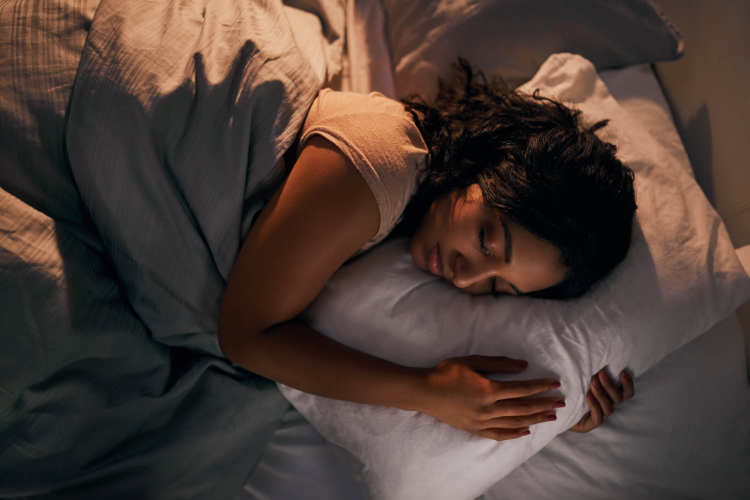What do you think of this article?
By Dr. David Woo - April 2, 2020

Antidepressants are well-known to affect sleep quality. (1) So it’s natural for patients to wonder if TMS, an alternative depression treatment, can also cause insomnia or sleep disruption. The answer is not usually. In fact, TMS may actually improve sleep.
The Relationship Between Depression and Insomnia
Depression and insomnia have what appears to be a cyclical relationship. Insomnia is one of the most common symptoms of depression, and researchers know that sleep deprivation puts people at a higher risk of developing depression and/or depression relapse. (2) One study shows that patients diagnosed with insomnia are at an increased risk of developing depression within 1 to 3 years. (3)
How Does TMS Improve Sleep?
Sleep loss, more specifically the loss of slow-wave sleep, can cause a decline in cognitive function and memory performance. (4) TMS has been shown to trigger slow waves in the brain associated with deep sleep. Slow sleep waves induce deep sleep and contribute to regeneration, allowing the brain to repair itself and consolidate the day’s memories. (5)
TMS can also improve sleep by relieving depressive symptoms. As patients begin to feel relief from depressive symptoms, they may also notice an improvement in their sleep.
TMS Is Currently Being Studied to Treat Sleep Disorders in People Without Depression
Insomnia is the most common sleep disorder and affects millions of people. The consequences of insomnia can reach social, medical, and psychological levels. (6) To ease this burden, scientists are studying TMS as a possible treatment for insomnia. Can TMS improve sleep for individuals with sleep disorders, even those who do not have depression? (7) I along with my colleagues are very excited to see what researchers will find in current and future research endeavors.
To learn more about TMS and how it can help patients with depression, visit our website.
Resources:
1. Wichniak A, Wierzbicka A, Walęcka M, and Jernajczyk W. Effects of Antidepressants on Sleep. Curr Psychiatry Rep. 2017;19(9):63. Link. Accessed March 11, 2020.
2. Nutt D, Wilson S, Paterson L. Sleep disorders as core symptoms of depression. Dialogues Clin Neurosci. 2008;10(3):329–336. Link. Accessed March 11, 2020.
3. Riemann D and Voderholzer U. Primary insomnia: a risk factor to develop depression? J Affect Disord. 2003 Sep;76(1-3):255-9. Link. Accessed March 11, 2020.
4. Bellesi M, Riedner BA, Garcia-Molina GN, Cirelli C, Tononi G. Enhancement of sleep slow waves: underlying mechanisms and practical consequences. Front Syst Neurosci. 2014;8:208. Link. Accessed March 11, 2020.
5. Massimini M, Ferrarelli F, Esser SK, Riedner BA, Huber R, Murphy M, Peterson MJ, and Tononi G. Triggering sleep slow waves by transcranial magnetic stimulation. PNAS. 2007;104(20):8496-8501. Link. Accessed March 11, 2020.
6. Mai E, Buysse DJ. Insomnia: Prevalence, impact, pathogenesis, differential diagnosis, and evaluation. Sleep Med Clin. 2008;3(2):167–174. Link. Accessed March 11, 2020.
7. He Y, Sun N, Wang Z, and Zou W. Effect of repetitive transcranial magnetic stimulation (rTMS) for insomnia: a protocol for a systematic review. BMJ Open. 2019;9(7):e029206. Link. Accessed March 11, 2020.
Dr. Woo has been seeing patients in private practice since 2002, always with the goals of combining evidence-based medicine with psychodynamic psychotherapy and collaborating with other mental health professionals to ensure the best possible outcomes for his patients. He has been certified to administer TMS at his practice since 2017. His greatest clinical interests include helping patients suffering from depression, anxiety, and obsessive compulsive disorder.



